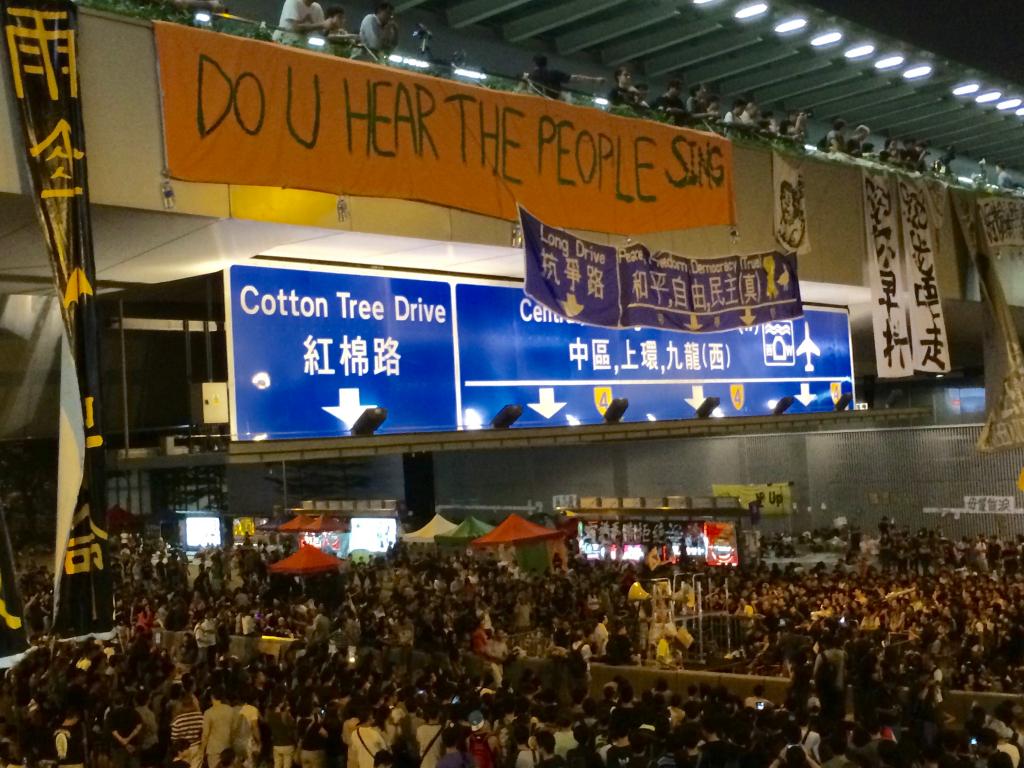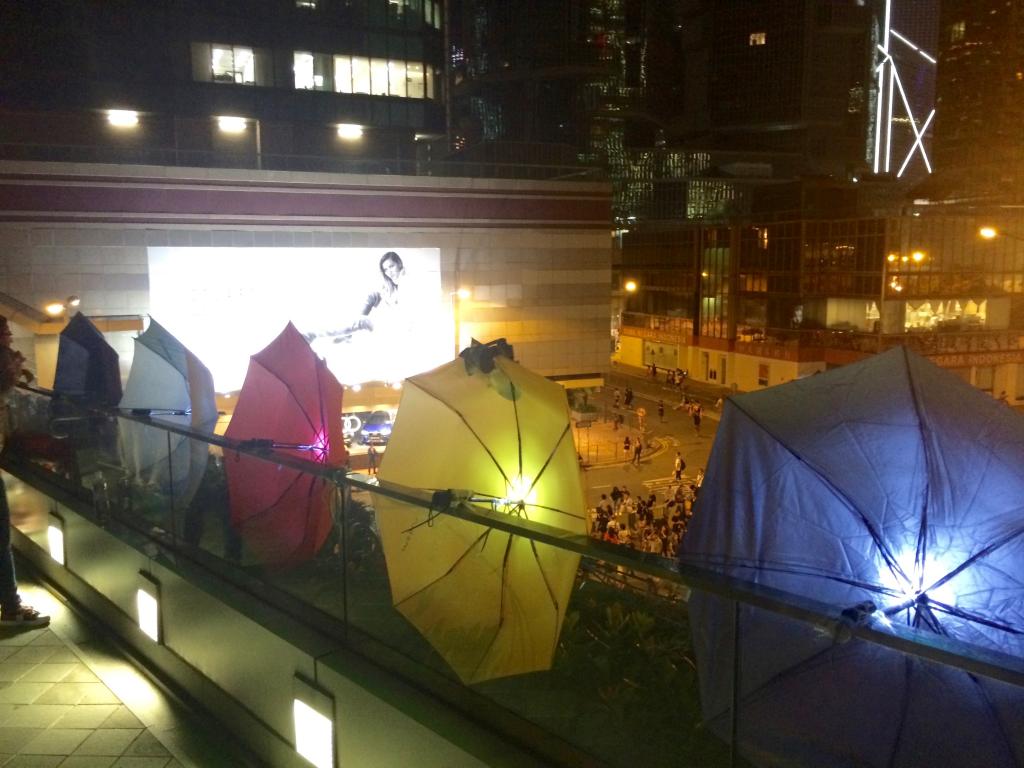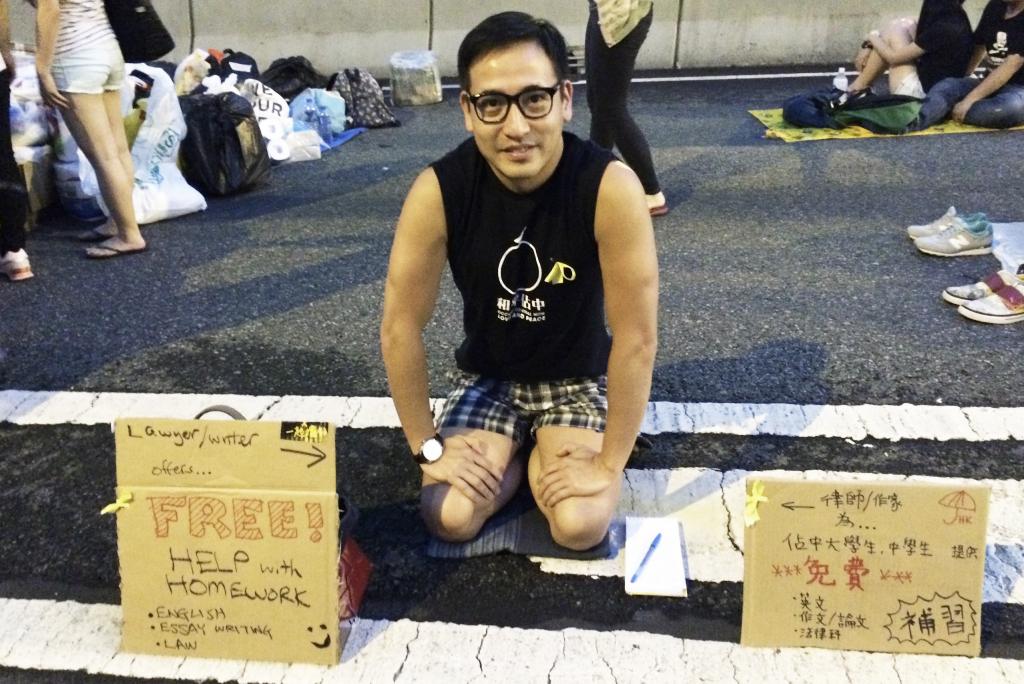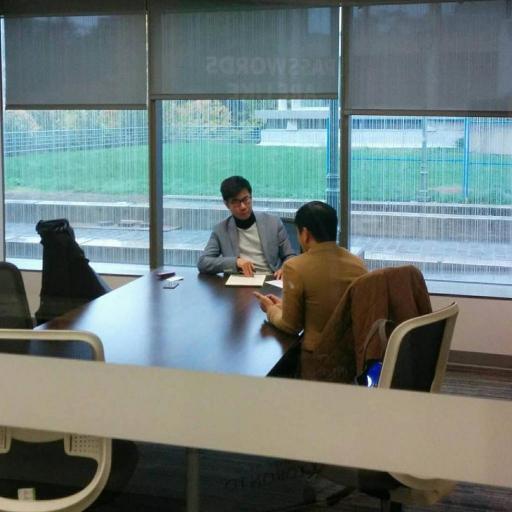Secondary menu
The Umbrella Movement: A popular uprising predicated on the 'naive' belief that anything is possible.
Professor Jason Y. Ng (JD/MBA ’01) and Karlson Leung (JD ’18) share their views and personal experiences on the ground two years after the 2014 Hong Kong demonstrations.
30 November, 2016
Karlson Leung (2L)

Protesters and banners during Occupy Central in Hong Kong’s Admiralty district. Photography by Karlson Leung.
28 September 2014 – “The perfect storm”
A blow of a whistle – a shout, and another wave of students rushed to the frontlines. If not for the fact that they were rushing towards lines of riot police, the scene could easily be mistaken for a classroom after the lunch-bell rings – with an array of backpacks, paper, and food boxes left behind in a flurry. After all, most of these protestors were trying their best to keep up with their daily routines amidst the disruption.
On 28 September, when the police raised a black banner that warned that teargas was about to be fired, that was the moment that we all knew that Hong Kong’s Occupy Central – the precursor of the Umbrella Movement – was not just a normal protest. That day the movement took a turn that would last 79 days.
Umbrellas on the Fragrant Harbour
This is not what one would expect to see in the heart of the financial district of the former British colony and modern metropolis of Hong Kong, a city long known for its sound political and financial institutions, and where the rule of law and civil rights were respected. The 2014 protests came as a surprise to everyone, not least the demonstrators themselves when it was initially planned to be a three-day demonstration. Nonetheless, this spontaneous and organized chaos became the typical scene in the Hong Kong protests that have since been dubbed “The Umbrella Movement”, as immortalized in pictures of the walls of umbrellas opened defiantly against the riot police on the other side.
The events leading to the main occupy demonstrations took off on 26 September, but it was the “28/9 teargas incident” that truly crystallized and unified the movement. The Umbrella Movement was the culmination of many factors related to broken promises and unmet expectations of electoral reform for electing the city’s Chief Executive. Chronic economic grievances, coupled with Chief Executive C.Y. Leung’s unpopularity [no relation to the author] and a general feeling that the city’s exceptionalism and autonomy was slipping away due to Beijing’s tightening grip, all provided for a deadly political cocktail that erupted in that fateful fall of 2014.
Alumnus Jason Y. Ng, University of Hong Kong adjunct law professor and author of “Umbrellas in Bloom,” characterized the 28 September teargas incident as having “changed the game.” According to Ng, the deployment of teargas – something rarely used in Hong Kong – was a key trigger for the Umbrella Movement. While protesters may be used to such measures in other cities around the world, from Ferguson to Bangkok, Ng stressed that “every social movement follows its own unwritten rules.” For example, in Bangkok there is an unspoken understanding that police would not attack designated “safe zones” for the elderly and children within protest sites – breaching these rules would spark serious public backlash. In Hong Kong, teargas was last used during a 2005 World Trade Organization demonstration involving around 10,000 protesters, mostly South Korean farmers. The use of teargas on 28 September violated the unwritten rule that Hong Kong police would use minimum force to quell a peaceful protest.

Umbrellas at the 2014 Hong Kong protests. Photography by Karlson Leung.
I arrived in Hong Kong in early October right after finishing a summer internship in Beijing as a young graduate student. There was relative calm, but uncertain air hung above the entrenched protestors who had braved pepper spray, teargas, and riot police only a few days earlier. It was an uneasy arrival. Although I had only been to Hong Kong once before during my teens, my connection to the home of my forebears was strong. Having been brought up in a household where political discussions were plentiful and where there was a family connection to the city and the region’s struggle for societal progress, Hong Kong had a homey familiarity.
That night I arrived, I decided to take a walk immediately that evening around the main encampments near Admiralty at the downtown core. I met up with my Hong Kong friends who, just a few weeks prior, were living and working with me in Beijing. Conversations in Beijing about the protests revealed attitudes ranging from mild annoyance and apathy, to a resentment of Hong Kong “troublemakers” for stirring up a commotion out of their apparent sense of entitlement. But here, the opposite held true. Citizens of all stripes and colours sat cross-legged, listening to and respectfully debating with fellow citizens and leading members of government, academia, and the judiciary.
That night, as we walked by an underpass, we heard Audrey Eu (余若薇), former member of the Legislative Council and former leader of the Civic Party, speaking to a group of about a hundred people of all backgrounds. There was no media presence, nor any disruption from the audience. In fact, it felt a bit too calm given the surroundings and the fact that this was delivered in the midst of a major demonstration with participants numbering in the hundreds of thousands. It was simply a lecture on the importance of the rule of law, for anyone who was willing to listen. This was a typical scene every evening when numbers swelled, as people left their offices and schools for the streets. As someone born and raised in Canada, where most protests number only in the hundreds, I had never seen such an extraordinary demonstration of civic activism and democratic expression.
While political party leaders, judges, and other prominent activists spoke candidly amongst the crowds, what was most salient was that anyone with a view to share could speak and captivate an audience. I walked by another student in an oversized American university jersey sharing his views over a microphone to a couple dozen passersby in the park. In another corner in the park, an elderly citizen lectured on the importance of free speech and universal suffrage. It was altogether a remarkable sight, and that feeling of civic activism resonated with me long after the last chants were voiced.
The demonstrations ended following a general decline in participation over the next few months. On 15 December, police cleared the remaining camps and protestors at Causeway Bay with little resistance and effectively brought an end to the protests.
Hong Kong today:
The Chief Executive is the head of the Government of Hong Kong and serves as the representative of the Hong Kong Special Administrative Region. The office was created in the aftermath of the 1997 Handover and replaced the Governor of Hong Kong, the representative of the Monarch of the United Kingdom during Colonial Hong Kong. The election of the Chief Executive is dominated by a nomination process that is widely viewed as an act of direct interference on the part of Beijing, followed by a “small circle election” involving 1200 members of industry and business leaders, who tend to be pro-establishment and pro-Beijing loyalists.
Hong Kong is due for another election for the city’s Chief Executive in March 2017. The question remains: what has the Umbrella Movement achieved and how has Hong Kong changed since then? At a guest lecture for the International Human Rights Program at the University of Toronto Faculty of Law, Professor Jason Ng spoke on his experiences and the lessons that can be learned.
Lessons learned:
One of the lessons that Ng highlighted was the virtue of patience. The road to democracy is a long one, and will take much more than 79 days. As Ng emphasized, in the case of the Umbrella Movement and similar uprisings, public support is often the only ammunition protestors have. As such, losing ground in the public opinion war may lead to the movement’s quick death. I was once quoted that a social movement like the one in Hong Kong needs to be swift and decisive in order to succeed. Future organizers must be wary of participant fatigue and disenchantment if tangible milestones are not set and achieved in due course. In Hong Kong, the vast majority of protesters could only bear sleeping on the streets and being on the frontlines for so long when no palpable goal was in sight.
Ng concluded that social awakening was the Umbrella Movement’s biggest achievement. He mused that there is often a common perception in Asia that Hong Kong is a deeply materialistic society, but the movement was able to awaken an entire generation to be more engaged in civil society. For example, many young people are now more interested in politics and some are running and even being elected for political office. The legacy of the Umbrella Movement, Ng concluded, is that “a seed of change and political engagement has been planted in everyone’s mind.”
Interview with Jason Y. Ng, JD/MBA 2001 (Toronto)
 Jason Y. Ng is the bestselling author of HONG KONG State of Mind (2010) and No City for Slow Men (2013). His latest tome, Umbrellas in Bloom (2016), is the first book published in the English language to chronicle Hong Kong’s occupy movement of 2014 and the last installment of a Hong Kong trilogy that tracks the city’s post-colonial development. Ng’s short stories have appeared in various anthologies and his socio-political commentary blog As I See It has attracted a cult following in Asia and beyond. Ng is a contributor to the Guardian, the South China Morning Post, EJ Insight and Hong Kong Free Press. He is also a full-time lawyer and an adjunct associate professor at the Faculty of Law of the University of Hong Kong. In 2016, he was elected President of Pen Hong Kong, the local chapter of Pen International which promotes literature and the freedom of expression around the world.
Jason Y. Ng is the bestselling author of HONG KONG State of Mind (2010) and No City for Slow Men (2013). His latest tome, Umbrellas in Bloom (2016), is the first book published in the English language to chronicle Hong Kong’s occupy movement of 2014 and the last installment of a Hong Kong trilogy that tracks the city’s post-colonial development. Ng’s short stories have appeared in various anthologies and his socio-political commentary blog As I See It has attracted a cult following in Asia and beyond. Ng is a contributor to the Guardian, the South China Morning Post, EJ Insight and Hong Kong Free Press. He is also a full-time lawyer and an adjunct associate professor at the Faculty of Law of the University of Hong Kong. In 2016, he was elected President of Pen Hong Kong, the local chapter of Pen International which promotes literature and the freedom of expression around the world.
This interview has been edited for length and clarity.
KARLSON LEUNG [KL]: You know it seems like you’re a modern renaissance man, you spent your formative years in Italy, the US, Canada, and Hong Kong. You’re a bestselling writer, a political activist, a lawyer at some of the top firms in the world, a foodie and a freelance photographer as well. How did this affect how you view your own identity now that you’re settled in Hong Kong? Do you feel more as an insider or outsider in the modern day post-1997 Handover metropolis?
JASON Y. NG [JYN]: It’s been 11 years since I returned to Hong Kong as an adult after all my exploits overseas. I think I will always have this outsider/insider dichotomy in my identity. It is an identity that has worked well for me as a writer. The insider perspective gives me the emotional attachment and sensitivity I need to write good stories. The outsider perspective, on the other hand, gives me the objectivity and ability to make comparisons with other cultures and other places I’ve lived in, as well as to add dimension and volume to my writing. The two are invaluable to a writer.
KL: It’s been almost exactly two years since the Umbrella Movement and I know that you have recently written a book on this topic so I wanted to ask you about your views on the protests. What do you think were some of the successes and failures? What were the perceptions on the ground like? What were the emotions like among the people you were with on the frontlines of the protests, and what were some of the daily obstacles and challenges that participants, especially the younger generations, had to face?
JYN: Let’s start with successes. The biggest achievement of the movement was social awakening. As I mentioned in my talk, Hong Kong people have this reputation of being materialistic, pragmatic and politically apathetic. We care – at least we used to care anyway – much more about the bottom line than ideology and principles. But all that changed after the Umbrella Movement. The movement helped connect the dots for people, and they started to see the link between politics and their daily struggles. For instance, the reason why we have to pay skyrocketing property prices is because of the collusion between government and property tycoons and the lack of accountability in government, and the only way to restore accountability is through universal suffrage. That realization, that collective awakening, was priceless.
There were other achievements that were tangential to the first point. That social awakening I talked about has made young people much more politically engaged. The younger generations are running for and winning political office, as we have seen in both the recent parliamentary election. We now have a young voice in our lawmaking bodies, which until these recent months, had been dominated by an older establishment. That change is refreshing if not promising.
As for failures, the movement obviously didn’t achieve what we had set out to achieve, which was to have universal suffrage vis-a-vis our chief executive by 2017. In fact, in a few months’ time, we will once again witness ‘un-democracy’ in action when the new chief executive will be selected by an election committee composed of only a small subset of the population – 1,200 members – instead of the 5 million eligible voters. It will be a jarring reminder that the Umbrella Movement failed to bring about true democracy to Hong Kong.
An even bigger failure was that we have pretty much sealed our fate in our fight for electoral reform. The Umbrella Movement has spooked the Communist leadership and hardened its position on Hong Kong’s governance. Beijing is now much less likely to make any compromises towards Hong Kong and in a way we have set the clock back on democracy for years.
With respect of your question about perceptions on the ground at the protest sites, I think the most intense feeling was the sense of impermanence. We didn’t know what was going to happen the next day, or even the next hour. Every day we asked ourselves the same question: will today be our last day? Remember, the Umbrella Movement was a spontaneous and unplanned mass demonstration, and no one had any idea how long the struggle would last. We had to live one day at a time, and it wasn’t easy living like that. For instance, the guys in charge of building furniture at the protest sites would ask the students: “How durable do you want us to make this shelter?” And the students would just look at each other and shrug, because they didn’t know either. What’s the point of making something that would last if the police might come tomorrow and clear the protest sites?

Professor Jason Y. Ng offering free homework assistance at the Hong Kong protests. Photography by Jason Y. Ng.
KL: Do you think the younger generations, after witnessing the outcome of the 2014 demonstrations, remain as politically active and concerned or even more so? Has there been a cultural or attitudinal shift in youth? Would you even go so far as to say that the movement ‘sowed the seeds’ for similar movements in the future?
Alternatively, do you think the economic considerations will win out in the end as people become disillusioned with the possibility of change and find that other factors like one’s own job security or school are more pressing their lives?
JYN: The Umbrella Movement has had a serious polarizing effect on Hong Kong society, and people have been pushed to two extremes.
On one hand, there are people who have grown sick and tired of the protest culture and they simply don’t want to think about demonstrations any more. Ordinary folks just want to get back to work, pay their mortgage, go on a vacation, etc. They have come to terms with the political and economic reality that Hong Kong will always be dependent on China. And so they keep their heads down and their mouths shut.
The other extreme are people who think to themselves: “I work hard but wealth is so entrenched in Hong Kong and there is no upward mobility for me.” They don’t see a way out. The only way to for the status quo to change is if there is more accountability in government and less collusion between government and the establishment. Problem is: after the Umbrella Movement ended without achieving any political gains, the path to democracy and accountability seems to have permanently closed. These people, most of them people in their 20s and 30s, channel their angry and hopelessness into the pro-independence movement.
But what unites these two groups of people is the seed of social awakening I talked about in my lecture. Regardless of which extreme they have been pushed into, people are more likely to step up and answer the call to arms when the next wave of the political movement hits. Even though not everyone may take action, the awareness and the reference point are already there. People have seen it done before and they will know what to do this time. They will know what works for them and what pitfalls to avoid. That seed is already planted in their heads, whether they have gone the radical route or the more docile and pragmatic route.
KL: In an earlier work, you described Hong Kong, Macau, and Shanghai as three dysfunctional sisters. Where do you think Hong Kong is heading in the next 10 years? Do you think Shanghai or other Chinese cities will overshadow Hong Kong by the 2047 expiration of Deng Xiaoping’s “One Country, Two Systems” preservation of Hong Kong’s way of life?
Further on that point, do you feel that some freedoms and rights are already deteriorating quite rapidly as a result of Hong Kong’s declining economic importance in Beijing’s eyes, in light of the treatment of student leader Joshua Wong, the missing booksellers, and others both at home and abroad?
JYN: I don’t think we have to wait until after 2047 to worry about Shanghai overtaking Hong Kong. Some say Shanghai has already overtaken Hong Kong in many ways: urban development, the art scene, the ability to attract talent. That being said, other people feel that Shanghai will never overtake Hong Kong because the latter still has a rule of law, as well as a robust set of political and legal infrastructures for businesses to thrive, whereas none of those things really exist in mainland China.
To me, however, that is a completely irrelevant question. I really don’t give a hoot if Shanghai overtakes Hong Kong or not. The rivalry among big cities is a lot like university rankings: they are often time a comparison between apples and oranges. So much of it depends on what courses you take, who your peers are, and what you want to do with your education. As a student, you want to work hard, try to do well and make the best of your education. Once you’re in, it doesn’t matter if U of T or McGill is number one.
The same thing is true for cities. Only a very small number of people care about the rivalry. It’s a bragging right for the ruling elite, but it doesn’t mean much, if anything, to the regular Joe. We would much rather be like Taipei than Shanghai. Taiwanese people enjoy free expression, a free democracy, but Taipei is probably ranked 35th on the top cities list! We would rather live in a functional society like Taiwan than in a dysfunctional society like China or Hong Kong.
KL: Let’s go back to when you were a student at the University of Toronto. Were you always quite engaged in socio-political issues since an early age? Looking back now, what advice would you offer to law students today who are interested in societal issues or international human rights?
JYN: I was part of the JD/MBA program, and I felt that my path had been more or less laid out for more. In my final year, for instance, I was a senior editor for the U of T Law Review but I was automatically put in charge of the business law cell. After I graduated law school, I went straight to New York and worked at a white shoe firm. I really did follow that well-beaten corporate law path. But years later, here I am, talking to you about fighting for democracy in Hong Kong.
I guess the takeaway message is that it doesn’t matter how you start your legal career, as long as you know and remember the things you care about. You don’t have to be a public interest or human rights lawyer on day one – if you do, that’s wonderful – but you don’t have to. As long as you know what you want and you’re secure about who you are, you can go back to the causes that are important to you later on in life. Quite frankly, I feel that you want to be somewhat financially secure before making yourself useful to others. It’s kind of like being on a plane and when the oxygen masks drop, you are supposed to put one on yourself before putting one on your child.
KL: And lastly, what would you was your favourite class in law school?
JYN: Hands down, it was constitutional law.
KL: No hesitation.
JYN: Absolutely not. I had Professor David Beatty for con law, and I worked really hard for his class. It was the one class I really looked forward to going to, in large part because it was my small group and we only had about 15-20 people in our class. I enjoyed the heated debate and discussion tremendously. After that I took U.S. constitutional law even though I was a corporate law student. I guess I just wanted to make sure that I take as many constitutional law courses as my timetable allowed because I was so inspired by the subject.
KL: And you’re definitely very involved in these constitutional issues now!
JYN: Definitely. Even now, I draw from these classes in my political commentary and advocacy work. Concepts like the proportionality test and the living tree doctrine still come in handy!

Karlson Leung (left) interviewing Professor Jason Y. Ng (right) after Ng spoke at a guest lecture for the International Human Rights Program.
